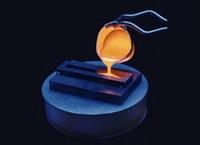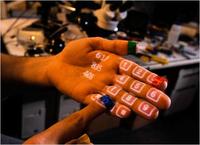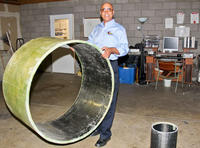-
New hurricane simulator to help find way to minimize storms’ destruction
Hurricanes in Miami can range from just rain and light wind to shredded houses, overturned cars, massive flooding, and death. Now, almost twenty years after Hurricane Andrew, Florida International University is using a new simulator to find ways to prevent the massive damage a hurricane can create
-
-
Glass offers a better way of storing U.K. nuclear waste

Researchers have shown, for the first time, that a method of storing nuclear waste normally used only for High Level Waste (HLW) could provide a safer, more efficient, and potentially cheaper solution for the storage and ultimate disposal of Intermediate Level Waste (ILW)
-
-
New camouflage makeup shields soldiers from searing heat of bomb blasts
The new camouflage makeup protects the face and hands for up to fifteen seconds before its own temperature rises to the point where a first-degree burn, which is a mild burn, might occur; in some tests, the new face paint can protect for up to sixty seconds, which could be important in giving soldiers time to move away from blast-related fires and also for use by civilian firefighters
-
-
ONR’s augmented-reality project progresses

The Office of Naval Research (ONR) yesterday demonstrated the next phase of an augmented-reality project which will change the way soldiers view operational environments — literally
-
-
Electronic nose detects airborne toxins down to the parts per billion level
Research create an electronic nose device with applications in agriculture, industry, homeland security, and the military; the device can detect small quantities of harmful airborne substances
-
-
Engineering students build U.K. first hydrogen powered locomotive
Engineering students and staff at the University of Birmingham have designed and built a prototype hydrogen powered locomotive, the first of its kind to operate in the United Kingdom
-
-
Simple new test combats counterfeit drugs in developing countries
The World Health Organization (WHO) estimates that at least 10 percent of the drug supply in developing countries consists of counterfeit medicines, causing thousands of deaths every year; many of the deaths occur among people who unknowingly take counterfeit antibiotics and anti-malaria medicines that do not contain the active ingredient to combat those diseases; in addition to lacking the active ingredient, counterfeit medicines may harm people by containing ingredients that are potentially toxic
-
-
Border Patrol kiosk detects liars trying to enter U.S.

The U.S. Customs and Border Protection (CBP) is using border crossing stations in Arizona to test new technology to detect liars as they attempt to enter the country; travelers are subjected to a 5-minute interview with the kiosk, while microphones monitor vocal pitch frequency and quality, an infrared camera monitors eye movement and pupil dilation, and a high definition camera monitors facial expression
-
-
New device dismantles pipe bombs safely, preserving forensic evidence
Thousands of pipe bombs are made each year, and thousands of pipe bomb threats are called into local police and FBI authorities across the country; many are false alarms, but those that are not can be deadly; dismantling a pipe bomb is tricky and serious business, and missteps during the dismantling process can produce catastrophic results
-
-
Geoengineering clouds to slow global warming

Researchers are taking a second look at the possibility of using futuristic ships to shoot salt water high into the sky over the oceans, creating clouds that reflect sunlight and thus counter global warming; The theory behind idea, called “marine cloud brightening,” is that adding particles, in this case sea salt, to the sky over the ocean would form large, long-living clouds
-
-
New technology combats global pandemic of drug counterfeiting
Drug counterfeiting is so common in some developing countries – in some studies, 50 percent of the drug samples from Southeast Asia have been counterfeit — that patients with serious diseases are at risk of getting a poor-quality drug instead of one with ingredients that really treat their illness
-
-
Aerospace materials for on-site building of pipes of infinite length

Concrete and steel pipes are built in short sections to fit on standard 18-wheel trucks; the heavy industrial manufacturing processes, long-distance trucking, and leak-prone joints used in steel and concrete pipe construction exact a heavy toll on the environment, not to mention bottom line; the solution: a new pipe design, consisting of a central layer of lightweight plastic honeycomb, which can be built onsite as a single section of virtually infinite length
-
-
Toilet Challenge, 1: Caltech’s solar-powered toilet wins Reinvent Toilet Challenge
The World Health Organization reports that 2.5 billion people around the globe are without access to sanitary toilets, which results in the spread of deadly diseases; every year, 1.5 million people, mostly those under the age of five, die from diarrhea; Caltech scientist awarded grant to develop solar-powered sanitation system
-
-
Toilet Challenge, 2: Loughborough’s hydrocarbonization design wins second Reinvent the Toilet Challenge prize
Researchers from Loughborough University, located in Leicestershire, United Kingdom , won second prize in the Reinvent the Toilet Challenge; their toilet uses a process called Continuous Thermal Hydrocarbonization which kills all pathogens to create safe to handle, valuable material and uses power from heat generated during processing
-
-
Toilet Challenge, 3: U Toronto wins toilet challenge third place for sand filter and UV-ray design
The U of T solution is novel in its simplicity. It uses a sand filter and UV-ray disinfecting chamber to process liquid waste and a smolder chamber, similar to a charcoal barbeque, to incinerate solid waste that has been flattened and dried in a roller/belt assembly
-
More headlines
The long view
New Technology is Keeping the Skies Safe
DHS S&T Baggage, Cargo, and People Screening (BCP) Program develops state-of-the-art screening solutions to help secure airspace, communities, and borders
Factories First: Winning the Drone War Before It Starts
Wars are won by factories before they are won on the battlefield,Martin C. Feldmann writes, noting that the United States lacks the manufacturing depth for the coming drone age. Rectifying this situation “will take far more than procurement tweaks,” Feldmann writes. “It demands a national-level, wartime-scale industrial mobilization.”
How Artificial General Intelligence Could Affect the Rise and Fall of Nations
Visions for potential AGI futures: A new report from RAND aims to stimulate thinking among policymakers about possible impacts of the development of artificial general intelligence (AGI) on geopolitics and the world order.
Keeping the Lights on with Nuclear Waste: Radiochemistry Transforms Nuclear Waste into Strategic Materials
How UNLV radiochemistry is pioneering the future of energy in the Southwest by salvaging strategic materials from nuclear dumps –and making it safe.
Model Predicts Long-Term Effects of Nuclear Waste on Underground Disposal Systems
The simulations matched results from an underground lab experiment in Switzerland, suggesting modeling could be used to validate the safety of nuclear disposal sites.
